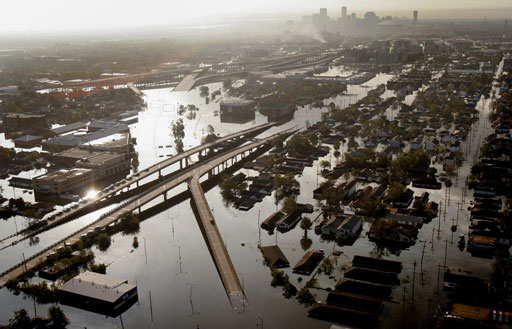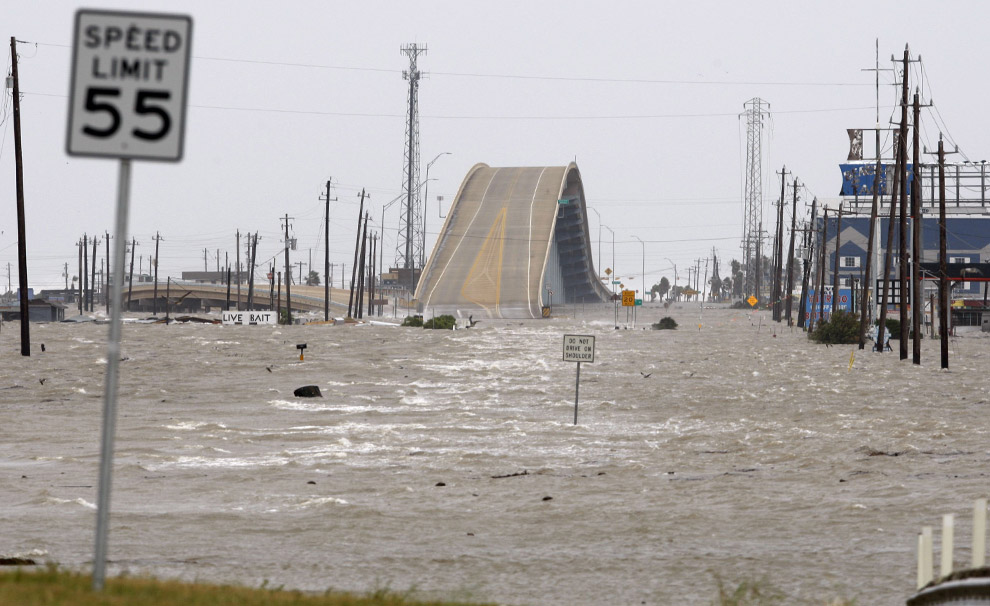Cities in the Flood Zone
 [Image: New Orleans after Hurricane Katrina; photographer unknown].
[Image: New Orleans after Hurricane Katrina; photographer unknown].One of very many interesting points made by Jan Zalasiewicz in his new book The Earth After Us is that rising sea levels in an era of global climate change might actually – ironically – increase humanity's long-term chances of urban fossilization.
"If we and our children are very unlucky over the next few decades," he writes, "and the waters rise swiftly, then many of our cities may be as well preserved as Pompeii, as though in aspic."
After all, he adds, "if the sea rises quickly enough, and there is not time for the waves to do their work, landscapes may be drowned entire. Only a few meters beneath sea level, and what was the land now lies below the destructive surf zone. A hundred meters below sea level, and even the most violent storm waves can scarcely be felt. So, let the sea flood in, with its level jumping by meters over centuries or decades – or perhaps even years – and there simply will not be time for this wave energy to erode the landscape."
 [Image: The aquatic aftermath of Hurricane Ike, photographed by Carlos Barria for Reuters; via The Big Picture].
[Image: The aquatic aftermath of Hurricane Ike, photographed by Carlos Barria for Reuters; via The Big Picture].Then, once everything's underwater, the silting will begin. The planet's submerged coastal and river-delta cities will thus be "covered with sand and mud," entombed within the very landscapes upon which they once rested.
- This would immediately put these regions beyond the reach of erosion – except perhaps for a little localized scouring by strong tidal currents – and into the kingdom of sedimentation. Our drowned cities and farms, highways and farms, would begin to be covered with sand, silt, and mud, and take the first steps towards becoming geology. The process of fossilization will begin.
So might rapid climate change mean not the complete erasure of humanity's material traces but, with fantastic irony, civilization's geologically long-term preservation?





Comments are moderated.
If it's not spam, it will appear here shortly!
Somehow I don't find this to be a particularly comforting vision of the (near!) future.
Additionally, at a certain depth under the sea, oxidation is much lessened, and the levels of bacterial action are much lower... so materials that would corrode or rot at sea level (where they are exposed to air), would be preserved in the deep water.
(sorry to not have a direct source for this information: it comes from a high school paper I wrote (13 years ago?) on ancient Greek ships. The only evidence of them is from those that sank in deep water, where the wood and metals have remained intact....)
Adam.
I agree, but don't you think it is at least refreshing to hear as opposed to the bleak outlook of most articles?
While I agree this is interesting, I wonder if I'm alone in my ambivalence toward popular culture's obsession with the apocalypse and our impending doom...
I'm neither a geologist nor a chemist, but this doesn't seem quite right to me. I'm sure the author has seen the effect of even a little bit of water on a house. Submerge it and it'll be primordial mud in--what?--a decade? The infrastructure of major bridges and skyscrapers would probably fare much better, but I have trouble seeing this undersea wonderland of perfectly preserved cities.
Democracy now.org did a great special today (Dec 19th) on the crazy shootings that happened... And it reminded me of high tide when it rains here in charleston!
We go kayaking, but, look out! No one thinks laws apply when nature goes awry... Tis a strange nature of mankind to abandon kindness when panic strikes...
pure fantasy. no matter how fast or high water levels rise, it won't happen like this. even then nothing much will be preserved. it's only the hubris of man that thinks otherwise.
How does the melting of polar ice cause the ocean levels to rise?I must be missing something.Could someone please explain.
(I should mention I'm in good company here.I doubt Archimedes would understand it,either.)
Corwin
I agree, but don't you think it is at least refreshing to hear as opposed to the bleak outlook of most articles?
Corwin: Melting floating polar ice will not cause ocean levels to rise, but polar ice that is suspended above sea level by a landmass (eg. on the continent of Antartica) does. And it's happening.
Post a Comment